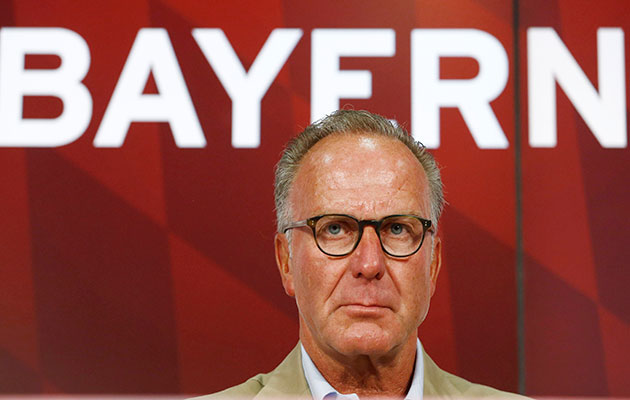Karl-Heinz Rummenigge has leaped to the defence of UEFA over the controversial realignment of the Champions League because fears of an increasing imbalance in club wealth was ‘fake news’.
Rummenigge was speaking in his capacity as chair of the European Club Association after its two-day general assembly in Athens attended by representatives of 154 leading clubs.
Currently the ‘fourth team’ of the top three leagues has to compete in the qualifying play-off round while the fourth-ranked league, currently Italy, has only two guaranteed places plus one in the playoff round.
This takes effect for the three-year cycle between 2018 and 2021 and was seen by critics as securing life for the club giants at the expense of the minnows. Aleksander Ceferin, before his election last September as UEFA president in succession to Michel Platini, was one of the critics.
However, as Ceferin tacitly acknowledged in a mission statement in Portugal last week, it is too late for the deal to be unpicked.
Rummenigge, with all his ECA membership in mind, was sensitive initially to criticism that the new deal widened the chasm of wealth between the haves and have-nots. But Rummenigge, now a member of the UEFA exco, has seen the light.
UEFA’s only mistake, he indicated after listening to a presentation from its deputy general secretary Giorgio Marchetti, had been one of the poor communication.
Rummenigge said: “I believe that opinions have been changed about the reform. I am 100pc certain the reform will make the Champions League more emotional and stronger than ever.
“The [financial] distribution in favour of eliminated clubs is being increased by 224pc. This is an enormous [sum of] money which has [produced] a good solidarity feeling in ECA. Also, the [financial] distribution to the Europa League is being increased by 264pc so I believe we have a huge growth of feeling of solidarity in our group.
“All the clubs within Europe are totally happy and understand the reform but the process of communications has to be done better by UEFA in future. Now the reform is well accepted by everybody.”
The group stage ‘promotion’ for the main leagues was described by ECA general secretary Michele Centenaro as a “minor increase . . . which should make the competition even more dramatic and competitive.”
Centenaro, echoing Rummenigge, described the Europe’s middle class as being the “largest benficiaries”.
The crisis of imbalance, according to both Centenaro and ECA vice-president Andrea Agnelli from Juventus, was a product not of Champions League income but of the massive variations between domestic broadcast revenues.
Rummenigge agreed, saying: “It’s totally false that rich and getting richer and the poor getting poorer. It’s fake news because the [UEFA] presentation today proves that the biggest beneficiaries are coming from the middle size countries like Holland and Scotland and so on.
“That has to be clarified to the public. I believe many clubs have been surprised about the fact based on this presentation so it will correct the opinion of last August.”
On this basis Rummenigge dismissed all speculation about the prospect of a breakaway superleague even though the clubs of the Big Five leagues reclaimed far less than the income their Champions League matches generated for UEFA.
He said: “The clubs from Germany, Spain, England, Italy and France are responsible for [bringing] in 86pc of the total income of the Champions League which is much less than the 60pc they get back in exchange.
“So this is more proof that very often, from the social point of view, things have not been communicated in the right way. Also, of course, not every club in these five countries is rich.”
Next target for ECA is refining the international calendar which, for Bayern Munich’s Rummenigge, risks placing players under too much stress in terms of national team fixtures.







